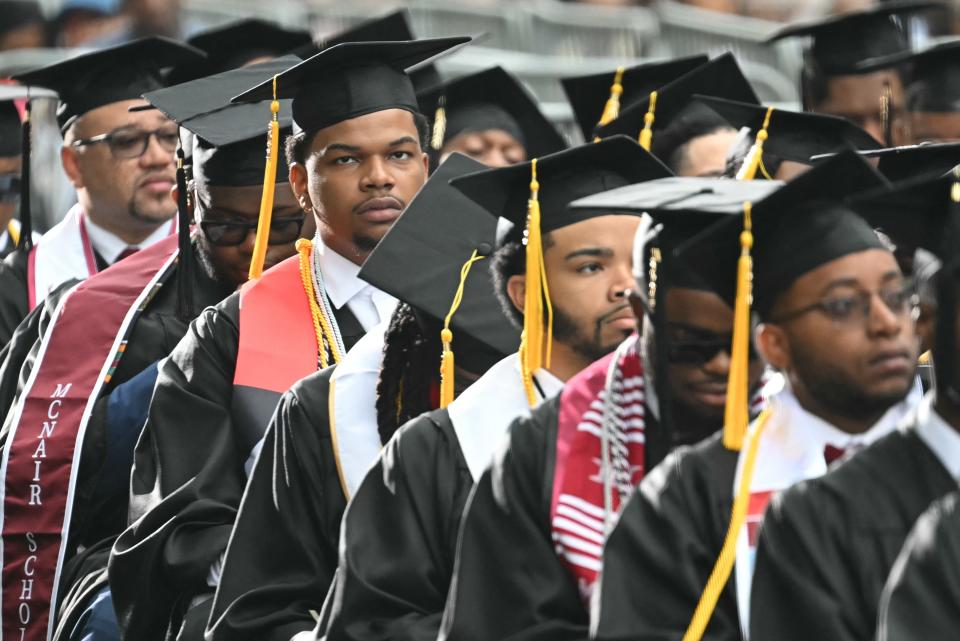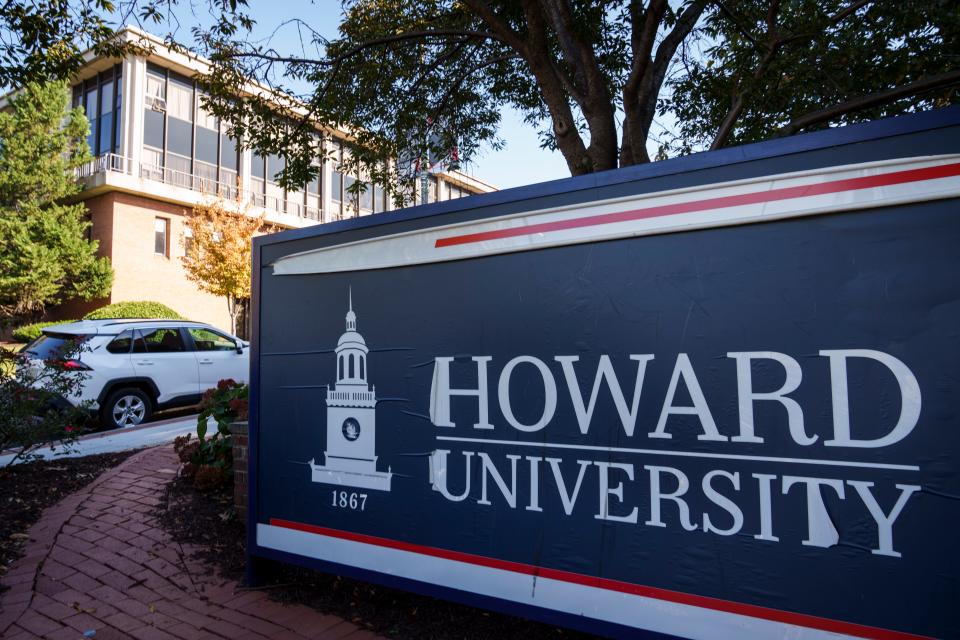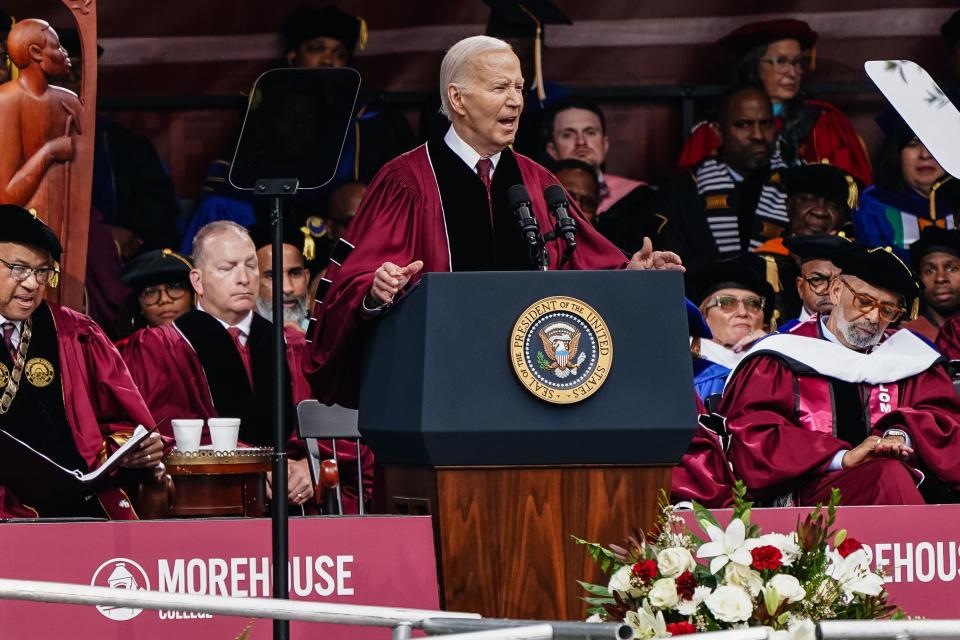HBCUs get historic funding from Biden administration. How has $16 billion been spent?
- Oops!Something went wrong.Please try again later.
The Biden administration recently announced that it has invested a record $16 billion in historically Black colleges and universities over the past three years.
The administration announced the record investment on Thursday ahead of Biden's commencement speech on Sunday at Morehouse College, one of the country's most revered African American academic institutions.
"These historic funding levels demonstrate the Administration's ongoing commitment to HBCUs, which serve as an engine for upward economic mobility in our country," the White House said in a news release.
USA TODAY looked at how that money has been spent and how the record investment compares to predominantly white universities. Here's what we found out.
Where was the money invested?
Over the past three years, the federal government has invested money in the following places:
Nearly $4 billion invested in HBCUs through the American Rescue Plan and other COVID relief legislation.
$2.6 billion invested from the Department of Education to build institutional capacity at HBCUs. According to the Biden administration, "these efforts support the growth and sustainability of HBCU degree programs; increase and enhance human, technological, and physical infrastructure for research; strengthen positioning to secure direct partnership opportunities; and create sustainable fund development."
Over $1.6 billion invested through Federal grants, cooperative agreements, and "other competitive funding opportunities"
Almost $950 million to support HBCUs in growing research capacity and related infrastructure
Nearly $719 million in grant funding to expand STEM academic capacity and educational programs
Over $150 million in federal contracting opportunities awarded to HBCUs, including for research and expansion of STEM education programs at the Department of Health and Human Services, Department of Transportation, Department of Energy, and the U.S. Agency for International Development
$1.6 billion in capital finance debt relief for 45 public and private HBCUs
Over $2.4 million in Project SERV funds to support HBCUs affected by more than a dozen bomb threats in 2022
$2.8 billion in need-based grants and other federal programs, including Pell Grants, Federal Work-Study and Supplemental Educational Opportunity Grants
Nearly $1.3 billion to support veterans attending HBCUs through the GI bill and other college, graduate school, and training programs

The impact of historically Black colleges and universities
There are more than 100 HBCUs around the country, according to Leslie Jones, founder and director of The Hundred-Seven, an organization that promotes the higher education institutions for Black students.
HBCUs represent 3% of all colleges and universities but account for 8% of all undergraduate enrollment of Black students and 13% of all bachelor's degrees earned by Black students.
Research suggests that HBCUs provide opportunities for upward mobility compared to other colleges in the country. Nearly a third of students who graduate from HBCUs will move up at least two income quintiles from their parents by the age of 30.
About 40% of all Black engineers, half of all Black teachers and 70% of all Black doctors and dentists earned their degrees from HBCUs, the Biden administration shared in their news release.
According to social mobility research by the United Negro College Fund, HBCUs support almost five times more students than Ivy League schools in helping community members transition from the bottom 40% in U.S. household income to the top 60%.

Where are HBCUs located in the country?

HBCUs have a history of being underfunded
Under federal law, historically Black land-grant universities are to receive equitable funding with land-grant universities that are predominantly white.
Education Secretary Miguel Cardona and Agriculture Secretary Tom Vilsack sent joint letters to 16 state governors, addressing funding disparities that totaled $13 billion for 16 historically Black land grant universities.
According to Inside Higher Ed, between 1987 and 2020, 16 state funded institutions had funding gaps ranging from $172 million to $2.14 billion, in comparison with predominantly white land grant universities. Tennessee underfunded its HBCU land grant college by $2.14 billion during this time period, the federal analysis found.
The following states underfunded their historically black land grant colleges:
Tennessee
North Carolina
Florida
Texas
Louisiana
West Virginia
Georgia
Alabama
South Carolina
Oklahoma
Missouri
Arkansas
Maryland
Virginia
Mississsippi
Kentucky
A separate study from philanthropic research group Candid and ABFE, a nonprofit pushing for investment in Black communities, found funding to HBCUs from large U.S. foundations fell 30% between 2002 to 2019.
As previously reported by USA TODAY, the average Ivy League institution received 178 times more foundation funding than the average HBCU, according to the study.
Funding to HBCUs dropped from $65 million in 2002 to $45 million in 2019. Between 2015 to 2019, the nation’s 99 HBCUs received $303 million – compared to a combined $5.5 billion given to the eight Ivy League schools in that same period.
Contributing: Marc Ramirez, Saleen Martin
This article originally appeared on USA TODAY: Biden administration gave $16 billion to HBCUs. How has it been spent?

